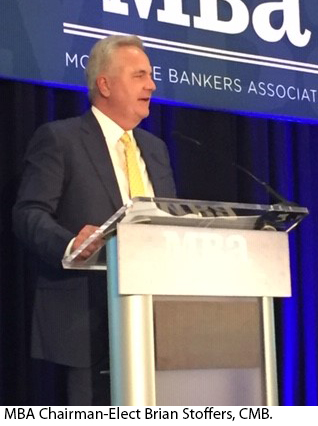
Stoffers: ‘Change is the Only Constant’
LOS ANGELES–The world is changing at an increasing rate, and servicing professionals need to be prepared, Brian Stoffers, CMB, CBRE Global President of Debt and Structured Finance and MBA Chair-Elect said here at the MBA Commercial/Multifamily Servicing & Tech Conference.
 “John F. Kennedy once said, ‘Change is the law of life and those who look only to the past or present are certain to miss the future’,” Stoffers noted. “He’s not suggesting we shouldn’t learn from history or forget our past. We just cannot stand still while the world around us moves forward.”
“John F. Kennedy once said, ‘Change is the law of life and those who look only to the past or present are certain to miss the future’,” Stoffers noted. “He’s not suggesting we shouldn’t learn from history or forget our past. We just cannot stand still while the world around us moves forward.”
Stoffers said in the current environment CRE companies are regularly acquiring each other, “and not just the large acquiring the small. We’ve also seen small and regional mortgage banking firms consolidate and form strategic alliances, we’ve seen life companies reach into the GSE seller/servicer space with acquisitions at a number of companies and private equity firms are acquiring large servicing/underwriting companies.”
The political environment is also driving change, Stoffers said. “The bottom line is we are already in the midst of a heated 2020 presidential election cycle and leadership at key regulatory agencies–think CFPB and FHFA–continues to change,” he said. “Closer to home, rent control proposals are active in several states–an Oregon rent control bill passed; Illinois and Colorado bills were blocked and California, New York, and Massachusetts rent control bills remain in play. In California, a ballot initiative also was defeated…for now.”
Mortgage servicers must remain engaged in the process to manage the political and policy risk these changes could bring, Stoffers said.
Technology represents the greatest catalyst for change, but it can also be a great equalizer, Stoffers said.
“Things like robotics, artificial intelligence, machine learning and all sorts of terms that had no relevance just a few years ago are driving business into new territories,” he said. “Technology increases a company’s productivity and profitability by transforming how we interact and where we work.”
Ultimately, buildings themselves are evolving, Stoffers noted. “Socially speaking, how people live, buy and work are transforming almost all commercial property types,” he said. “As e-commerce continues to grow, retail centers reshape their businesses to deliver experiences such as more restaurants, live music events, theaters, gyms or craft breweries. Apartment buildings are transforming into apartment communities, also providing dining, grocery and pet services at their doorstep. Offices, parking, hospitality and industrial properties all are undergoing similar changes.”
Loan servicers see changes every day from the leases borrowers wish to put in place to the capital expenditures owners infuse into the properties to keep them competitive, Stoffers said.
As the economy moves toward the longest economic expansion in recent history, the commercial and multifamily business is entering “uncharted territory,” Stoffers said. “It doesn’t feel bad, but it creates a certain uneasiness.” He said the market has entered a new phase, which he called a plateau.
But global growth rates have slowed and there may be more domestic economic slowdown ahead, Stoffers said. For servicers, “downturns in production don’t necessarily mean a downturn in servicing work or efforts,” he said. “In fact, we all realized that downturns resulting from a slowing economy can mean more work for servicers.”
Servicers can often be caught between decreasing income from originations and the need to continue and often expand services to existing portfolios, Stoffers said. Logically, servicing troubled loans and portfolios require more resources than servicing performing portfolios.
“The information and data you gather, analyze and communicate are critical to the decisions being made by portfolio managers every day,” Stoffers said. “Your roles are vital to the health and strength of our businesses–driving technology innovation to allow you to meet the demands of today’s borrowers, investors, and even current regulations.”
